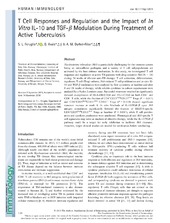T Cell Responses and Regulation and the Impact of In Vitro IL-10 and TGF-beta Modulation During Treatment of Active Tuberculosis
Peer reviewed, Journal article
Published version

View/
Date
2017-02Metadata
Show full item recordCollections
Original version
https://doi.org/10.1111/sji.12511Abstract
Mycobacterium tuberculosis (Mtb) is particularly challenging for the immune system being an intracellular pathogen, and a variety of T cell subpopulations are activated by the host defence mechanism. In this study, we investigated T cell responses and regulation in active TB patients with drug-sensitive Mtb (N = 18) during 24 weeks of efficient anti-TB therapy. T cell activation, differentiation, regulatory T cell (Treg) subsets, Mtb-induced T cell proliferation and in vitro IL10 and TGF-beta modulation were analysed by flow cytometry at baseline and after 8 and 24 weeks of therapy, while soluble cytokines in culture supernatants were analysed by a 9-plex Luminex assay. Successful treatment resulted in significantly reduced co-expression of HLA-DR/CD38 and PD-1/CD38 on both CD4(+) and CD8(+) T cells, while the fraction of CD4+ CD25 high CD127 low Tregs (P = 0.017) and CD4(+) CD25(high) CD127(low) CD147(+) Tregs (P = 0.029) showed significant transient increase at week 8. In vitro blockade of IL-10/TGF-beta upon Mtb antigen stimulation significantly lowered the fraction of ESAT-6-specific CD4(+) CD25(high) CD127(low) Tregs at baseline (P = 0.047), while T cell proliferation and cytokine production were unaffected. Phenotypical and Mtb-specific T cell signatures may serve as markers of effective therapy, while the IL-10/ TGF-beta pathway could be a target for early inhibition to facilitate Mtb clearance. However, larger clinical studies are needed for verification before concluding.
